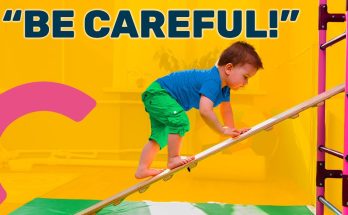Sleep is essential for a baby’s development, and as any parent knows, getting your little one to drift off peacefully can sometimes feel like a challenge. One of the most effective tools to help your baby sleep better is soothing music. Whether it’s soft lullabies, white noise, or gentle instrumental tunes, the right kind of music can create a calm environment that helps babies relax and settle into slumber.
In this article, we’ll explore the most relaxing music for babies, why it works, and how to use it to create the ideal sleep environment for your little one.
Why Music Helps Babies Sleep
Babies find comfort in sounds they’ve already heard while in the womb. The rhythmic sound of the mother’s heartbeat, the rush of blood flow, and the ambient noises from outside all create a familiar background sound. Once born, babies are naturally drawn to soothing sounds that remind them of the womb environment, and music is one of the best ways to recreate that feeling of security.
Additionally, music can help regulate a baby’s mood and calm their nervous system. It has been shown to lower stress hormones, slow the heart rate, and ease the transition from wakefulness to sleep. The right kind of music not only promotes relaxation but also aids in forming sleep associations, helping babies to recognize that it’s time to sleep when they hear the familiar sound of lullabies or calming melodies.
1. Classical Music for Babies: Gentle and Calming
Classical music is one of the most effective types of music for promoting sleep in babies. Its calming and structured compositions are known to have a soothing effect on both adults and babies alike. The soft melodies and lack of sudden loud noises make classical music a natural choice for bedtime.
- Mozart and Beethoven: Many parents turn to the works of composers like Mozart, Beethoven, and Brahms to create a peaceful sleep environment. Their slower movements and harmonious melodies can help calm a fussy baby and encourage sleep.
- Lullaby Versions of Classical Pieces: There are many lullaby renditions of famous classical pieces. These versions tend to be slower and more soothing, perfect for helping babies fall into a deep, peaceful sleep.
2. White Noise and Nature Sounds: A Constant, Soothing Sound
White noise is one of the most popular tools parents use to help their babies sleep. It mimics the constant sounds babies hear in the womb, such as the heartbeat and internal body sounds, which can be comforting and familiar.
- White Noise Machines: These devices generate a consistent hum or soft whooshing sound that drowns out more disruptive background noises, like traffic or household sounds, which may otherwise disturb your baby’s sleep.
- Nature Sounds: The sounds of rain, ocean waves, or rustling leaves are also incredibly calming for babies. Nature sounds have a gentle rhythm and are often repetitive, which creates a peaceful atmosphere that helps babies drift off to sleep.
For babies who are easily startled by sudden noises or changes in their environment, white noise or nature sounds can help create a steady, soothing background noise that lulls them into sleep.
3. Lullabies: Classic Tunes with a Soothing Rhythm
Lullabies have been used for centuries to help babies sleep. These familiar tunes often feature soft, slow tempos and gentle melodies that encourage relaxation. The repetition of the music is comforting and signals to your baby that it’s time to wind down.
- Traditional Lullabies: Classic lullabies such as “Twinkle, Twinkle, Little Star,” “Rock-a-Bye Baby,” and “Hush, Little Baby” are timeless favorites. The lullaby rhythm, often slow and repetitive, has a naturally calming effect.
- Lullaby Albums: Many artists create entire albums of lullabies specifically designed for babies. These albums typically feature gentle vocals, soft instrumentation, and calming rhythms that are perfect for creating a sleep-friendly environment.
Singing a lullaby to your baby or playing a soft instrumental version can become part of a soothing bedtime ritual that signals to your little one that it’s time to sleep.
4. Soft Instrumental Music: No Lyrics, Just Peaceful Tunes
For babies, instrumental music is often more soothing than music with lyrics. The absence of lyrics allows the baby to focus solely on the soothing sound of the instruments, without being distracted or overstimulated.
- Piano or Harp Music: Soft piano or harp melodies are particularly effective for calming babies. These instruments have a gentle, flowing sound that can easily relax your baby’s mind and body.
- Music with a Slow Tempo: Choose music that has a slow, steady tempo. Pieces with slower rhythms are more conducive to sleep because they help slow down your baby’s heart rate and create a sense of calm.
Instrumental versions of lullabies or ambient music, such as piano renditions of popular songs, can work wonders for encouraging deep, restful sleep.
5. Ambient and Sleep Music: Relaxing Soundscapes
There are many types of ambient music designed specifically to help babies sleep. These soundscapes typically include soft melodies combined with calming sounds like wind, water, or birdsong, making them perfect for creating a tranquil atmosphere.
- Sleep Music Albums: Some artists create entire albums of ambient sleep music designed to gently ease babies into a restful state. These albums often include long tracks that play for hours, ensuring your baby remains calm throughout the night.
- Relaxing Sound Apps: There are several apps available that offer relaxing sleep sounds and music, including rainstorms, forest sounds, and soothing white noise. Many of these apps allow you to customize the length and intensity of the sound, so you can find what works best for your baby.
These types of music are great for setting a peaceful, relaxing tone and creating a consistent sleep environment that helps your baby feel secure.
6. Singing and Voice Soothing: Your Voice Can Be the Most Comforting Sound
While recorded music is great, don’t underestimate the power of your own voice. Your baby will recognize your voice even before birth, and hearing it can bring them a sense of comfort and safety. Softly singing to your baby or humming can be just as effective as playing lullabies.
- Gentle Singing: Softly singing to your baby can provide them with the comfort they need to relax. It also strengthens the bond between you and your baby, creating a sense of security and love.
- Humming: Some parents find that simply humming a gentle tune can help their baby relax. The rhythmic sound of your voice, combined with the soothing vibrations, has a calming effect on babies.
Conclusion: Creating the Perfect Sleep Environment with Music
Music is a powerful tool when it comes to promoting restful sleep for babies. Whether you opt for soothing lullabies, calming classical music, white noise, or your own voice, the right sound can help create a peaceful sleep environment that promotes relaxation, aids in falling asleep, and helps your baby stay asleep longer.
As with any sleep aid, consistency is key. By incorporating calming music into your baby’s bedtime routine, you can help them establish healthy sleep habits while nurturing their developing brain. And remember—whether you’re using pre-recorded music or singing your own lullabies, your baby will feel comforted and loved by the sounds you provide. Sweet dreams!



